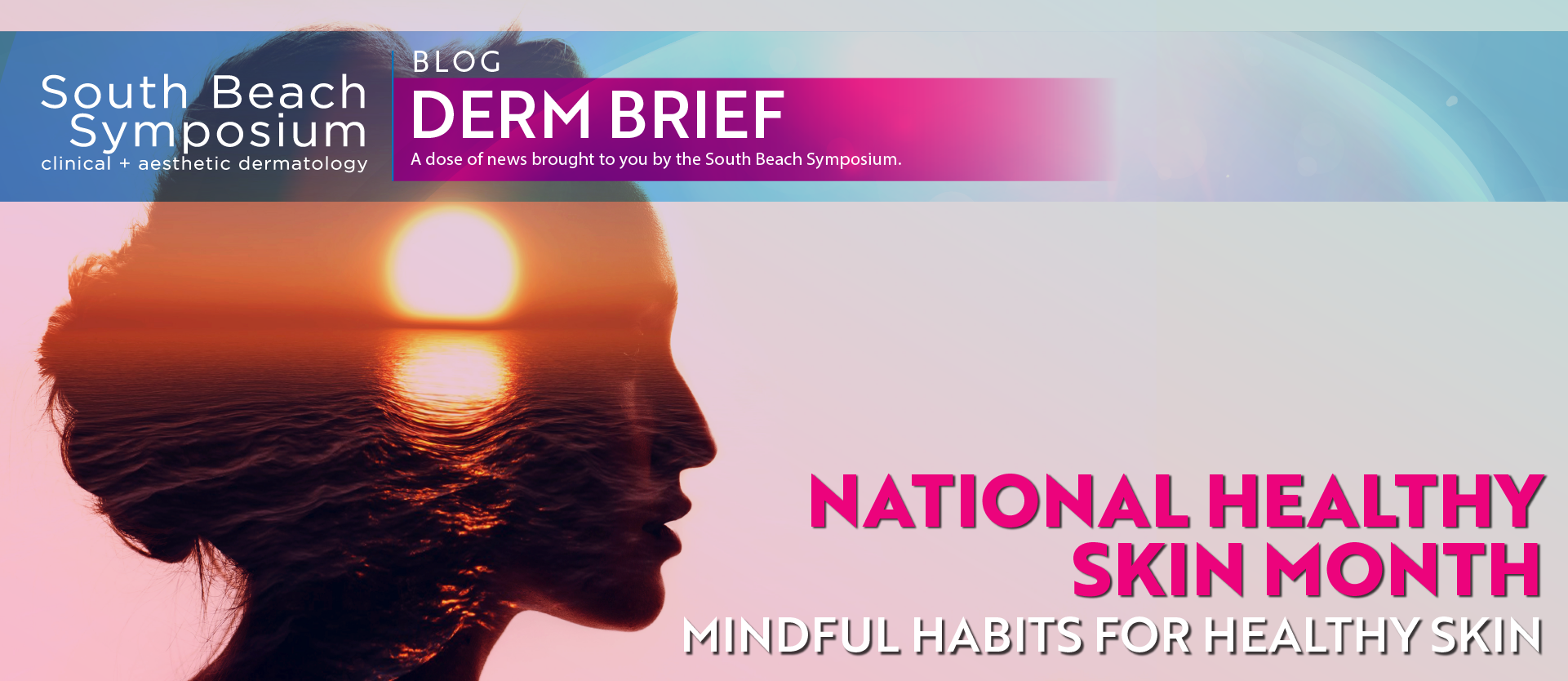November marks the beginning of National Healthy Skin Month, an observance sponsored by the American Academy of Dermatology as part of its public health program to raise awareness of skin health. Its efforts are focused on helping the public understand, prevent, and recognize skin conditions as well as to maintain healthy skin year-round. During National Healthy Skin Month, experts provide tips for promoting healthy complexion – such as washing your face every day, effectively protecting the skin against sun damage, and moisturizing daily – while encouraging individuals to self-examine regularly and consult a board-certified dermatologist with any irregularities or suspicious growths as part of the skin cancer prevention effort.
Mindfulness has been promoted for its wide-ranging health benefit, including stress reduction, improved sleep patterns, and elevated mood. Acne, psoriasis, and other common inflammatory skin conditions have been associated with stress hormone production – which is also tied to premature aging. Rather than treating these conditions with medication, recent research implies the potential benefit of a mindful approach. A 2018 study revealed that mindfulness-based stress reduction had a positive impact on wound healing, while a systematic review published in April 2019 found mindfulness-based therapies to improve psoriasis symptoms.
5 Mindfulness Habits for Healthy Skin
Understanding of the connection between skin and mental health continues to grow; increasingly, studies are beginning to adopt a more holistic approach to skin care, considering the impact of emotional health on common skin conditions and overall skin health. Research suggests that promoting healthy skin may involve stress management – achieved through mindfulness strategies, which can also improve both physical and mental health. Implementing the following mindful habits into the day has he potential to help maintain a clear, healthy complexion.
1. Breathing Exercises
One of the most common mindfulness techniques relies on breath work. Breathing exercises, such as following a 4-7-8 pattern, can promote feelings of calm and help lower stress levels. To begin, individuals can inhale for a count of 4, hold the breath in for a count of 7, and then slowly exhale for a count of 8, repeating as necessary. Incorporating mindful breathing can greatly affect the stress response by decreasing cortisol production, in turn reducing inflammation, lowering blood pressure, and slowing down heart rate.
2. Taking Time
Another effective strategy to promote mindfulness and reduce stress is to take several pauses during the day to slow down, take stock, and approach the current moment with awareness. Slowing down, taking a break, and taking several deep breaths throughout the day can significantly decrease cortisol production, benefiting not only the body but also the skin.
3. Meditation
Today, meditation is one of the most highly praised stress management strategies and has been proven to help fight chronic diseases, such as depression, cardiovascular disease, and chronic pain. A popular technique that brings attention to the body has been proven to reduce stress levels, improve mood, and enhance quality of life. The body scanning meditation method focuses on every part of the body in a sequence, bringing awareness to each part by moving from head to toe. There are many types of meditation to choose from; while some are more approachable than others, the underlying premise of quieting the mind and invoking stillness remains central to each of them.
4. Awareness
An integral part of mindfulness-based practices, awareness can be utilized to manage stress by intentionally focusing thought patterns on the current moment. By bringing awareness to the present, the technique aims to shift the focus from anxious ruminating or dwelling on the past to the present experience, resulting in increased mental and emotional well-being.
5. Muscle Tension
Not only does the stress response elicit increased cortisol production leading to premature aging, but it can also lead individuals to hold tension in different areas of the body, including the face. Taking time throughout the day to recognize and relax any tenseness in facial muscles can both work to prevent fine lines and decrease stress-induced tension, improving mood and mindfulness.
As many common skin concerns and inflammatory conditions have been linked to excessive cortisol production tied to chronic stress and poor emotional state, the importance of implementing and maintaining stress-reducing habits such as these can significantly reduce symptoms and promote a healthy complexion. Developing a mindfulness-based routine focused on controlling the stress response and its associated adverse effects may prove beneficial to skin health – as well as mental and physical wellness – while the connection between the mind and skin is further investigated in forthcoming research.
















